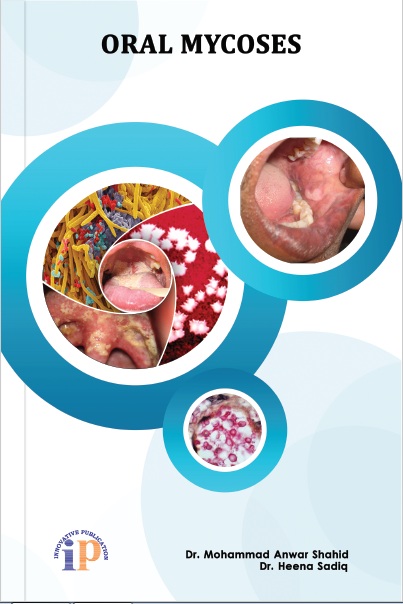Oral Mycoses
1. Dr. Mohammad Anwar Shahid has done his B.D.S. from Hazaribag College of Dental Sciences and Research, Hazaribag, Jharkhand and is now pursuing his M.D.S. in the Department of Oral Pathology and Microbiology at I.T.S. Dental College, Hospital and Research Centre, Greater Noida, Uttar Pradesh. He has a special interest in patients suffering from fungal infections thus this book has come into its existence. 1. He is an active member of IDA Jharkhand. 2. He is an active member of Indian Society ofOral Pathology and Microbiology. 2. Dr. Heena Sadiq did her BDS from Himachal Institute of Dental Sciences and has taken up the branch of Oral Pathology and Microbiology for her masters in dentistry. She did her Masters (MDS) from ITS Dental College, hospital and Research Centre, Greater Noida in the year 2015. She is presently working as Tutor in the Department of Oral Pathology & Microbiology at Indira Gandhi Government Dental College and Hospital, Jammu. She has a number of publications to her credit both nationally and internationally. She has also presented many scientific presentations in various national and international conferences. She has a number of books to her credit as author and has been a key contributor to many books for both national and international publication house. She is an active member of 1. Indian Dental Association. 2. Indian Association of Oral and Maxillofacial Pathology. ... Read more Read less
Normal oral flora comprises a diverse variety of microorganisms which includes eubacteria, archaebacteria, fungi, mycoplasmas and protozoa. Among these, fungi are classified as eukaryotes, and the most important one belong to the genus Candida. Human infections caused by Candida albicans and other related spp. range from the more common oral thrush to fatal, systemic super infections in patients who are afflicted with other debilitating diseases and in immunocompromised persons. There are more than 100,000 known fungi, but only few invade human tissues. These fungi are common saprophytes of soil and decaying vegetation, and person to person transmission is rare, but Candida is an exception. The main obstacles for these fungi to grow in man are the elevated temperature and cellular immunity. Humoral immunity does not seem to be important. Systemic mycoses are common in endemic areas, but usually resolve spontaneously without treatment. Most are opportunistic infections, involving immunosupressed persons and frequently cause oral lesions. The importance of these opportunistic infections has dramatically increased as immunosupressed conditions are more frequent. It is important to consider that mycosis of the mouth can be the primary manifestation of AIDS.











